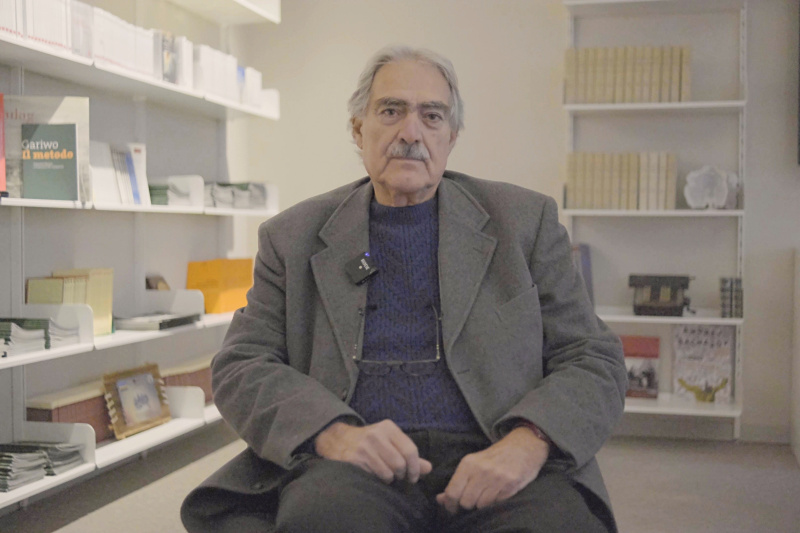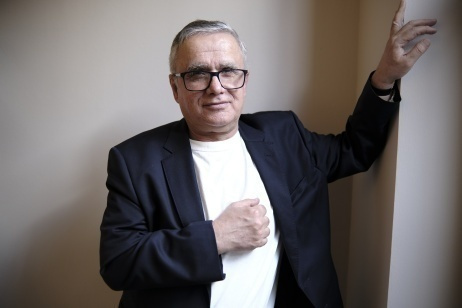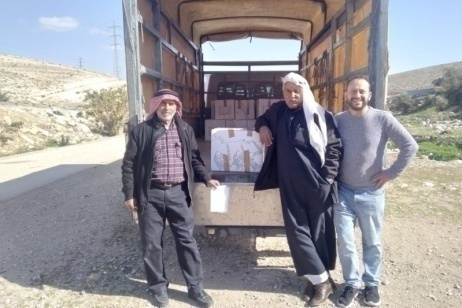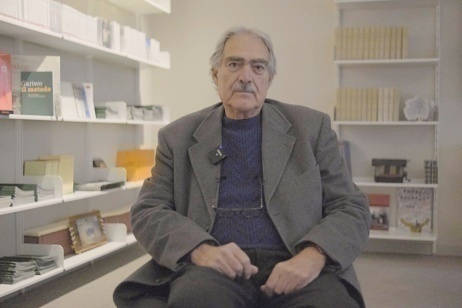On Thursday 11th
January, at the UN International Court of Justice in The Hague, hearings started on the case presented by South Africa, according to which the war in the Gaza Strip constitutes an act of genocide against the Palestinian people. It is a complex trial having profound political significance: never before has the International Court of Justice condemned any State for genocide.
Regardless of what the Court will rule - it will probably take many years to do so - can one say that a genocidal act is taking place in Gaza? If not, how can one define what is happening? After Hamas attack last 7th October and the subsequent war waged by Israel, the use of the terms “genocide”, “war crimes”, “crimes against humanity”, “pogrom” has increased exponentially in the media and social networks. We asked Professor Marcello Flores, one of Italy’s leading experts in Genocide Studies, to give us his views on each of these terms and how they apply to the Middle Eastern context.
Mr. Flores, please help us clarify these terms. What is a genocide?
According to the Genocide Convention promulgated on 9th December 1948, a genocide is the partial or complete destruction of an ethnic, religious or national group. However, it applies to cases when the perpetrator aims at destroying the group as such.
What does this mean? How does it differ from other crimes?
It means that it is not violence, albeit terrible, due to reasons such as war, the will to conquer, overpowering of power. It must be the result of the will to make a specific ethnic, religious or national group disappear from humanity. Evidently, the perpetrators of that type of violence believe that this group cannot and should not have the right to live.
Can the 7th October attack by Hamas be considered as a genocidal practice?
When jurists address the question, they will do so with extreme difficulty while being sensitive in doing so, as it has generally been the case any time international justice had to decide whether some episodes of violence were to be considered as genocide or not. Personally, I do not think it can be considered as genocide, but rather as a crime against humanity, because it stems from the will to indiscriminately massacre those one meets, going after them in kibbutzim and in a rave - which presumably mass murderers knew was taking place at the time. It was undoubtedly based on general planning, though without the will to accomplish anything beyond a violent, demonstrative massacre, aimed at striking suddenly and probably also at provoking some reaction.
Can Israel’s response in Gaza be considered as genocidal? What can one say about South Africa’s complaint to the International Court of Justice in The Hague?
I believe the South African denunciation represents the desire to bring the government of Israel before international justice as soon as possible. The accusation of genocide is the most serious one, therefore it is the one that somehow leads to the possibility of a trial, albeit an initial one, as soon as possible. Remember, for example, that after Operation Cast Lead perpetuated by the Israeli army in Gaza some fifteen years ago, a UN commission identified the actions of both the Israeli army and Hamas as crimes against humanity. However, the International Court of Justice did not intervene. I believe that the reaction that the Israeli army had in Gaza - undoubtedly disproportionate in terms of international law - cannot be considered as genocide, but it can certainly be considered as a war crime or as a crime against humanity, in that the attack and involvement of civilians are absolutely evident based on all documents we have, although we should better analyse generic information we get from the media. I would, however, rule out the possibility of speaking of genocide, except from a propaganda point of view, which serves little purpose, in my opinion.
Speaking of clarity on the use of words, what is the difference between a war crime and a crime against humanity?
War crimes are listed in Geneva Conventions. If you look at the statute of the International Criminal Court, you will find dozens of acts that can be considered as war crimes, including the bombing and destruction of hospitals, schools, religious, worship or cultural buildings, as well as the involvement of civilians in killings. It is extremely complex to analyse it: at least since the Second World War, every war has been largely directed against civilians. However, torture of prisoners certainly falls under war crimes. Crimes against humanity take place when civilians are the most affected as such, not as secondary victims of military actions, perhaps because they are somehow held co-responsible for the power one wants to hit. However, there are legal developments in this sense.
Which ones?
For instance, since the second half of the 1990s, mass rape has been deemed as a war crime and a crime against humanity and can also be considered as a means for genocide. This was the case in Rwanda, in a couple of trials. And this is one of the most relevant changes in international law, just think how hundreds of thousands of rapes took place in the first two world wars, which were somehow considered as unavoidable or at least as part of the war. From this point of view, I believe that the lengthy New York Times investigation into the violence against women perpetrated by Hamas on 7th October is a significant collection of evidence for international justice.
Speaking of words related to 7th October, many have described Hamas attack as pogrom.
Pogrom has symbolically become a term for indiscriminate slaughter. For the sake of rigor, I do not think the attack of 7th October can be defined as pogrom. Pogroms were episodes of spontaneous mass violence that occurred towards the end of the 19th century in a number of cities in Russia and Poland against local Jewish communities. However, they stemmed from something quite spontaneous. In response to the accidental wounding of a non-Jewish child by Jews, the Jewish community was attacked, many were injured or killed, the synagogue was burnt and so on. The term pogrom was born in that very specific context. Spontaneity is completely lacking in the attack of 7th October, in that it was an organised military action, although it involved not only the military, as it seems, but also citizens of the Gaza Strip who were not militarily organised. However, the core of that action was not a spontaneous uprising. I also believe that this word has become a way to define mass violence directed against someone. But since not everyone really knows what it means and how it came about, one can tolerate such usage.
Another word used to describe severe discrimination suffered by Palestinians is apartheid. Throughout your career, you have significantly dealt with apartheid in South Africa.
Apartheid is very specific and belongs to the history of South Africa. It refers to the legislation that came into being in the years immediately following the Second World War, which tends to codify and implement what was already an existing racist policy. It implies clear and total separation, from all points of view, of the black population - which in that case was the majority - from the white population, which was the dominant minority. In terms of political power, this meant that the black population could not live in the same parts of town as the white population, so much so that “townships” were built, like Soweto, the most famous one. Different means of transport existed for blacks and for whites. In the United States, the same means of transport included one part reserved for whites and one part for blacks, as in the case of Rosa Parks, who started the fight for civil rights in 1954. In South Africa, by contrast, a black person could not ride in any means of transport reserved for whites. Blacks had permits and mandatory routes to go to work, so it really was deliberate and complete separation, which was also strongly symbolic. It seems to me that one can make various judgments on the occupation or oppression of the State of Israel towards the Gaza Strip and, to some extent, also the West Bank, but I would not say it is apartheid. On the one hand because, for example, Israeli Arab and Palestinian citizens have voting rights like other citizens within the State of Israel. Those who live in occupied territories have a margin of self-organisation, which one can judge to be more or less fictitious, but which nonetheless exists. For instance, if an apartheid policy existed, Palestinians could not enter Israeli hospitals. Therefore I think this is an ideological-propagandistic straining on the part of all those who want to emphasise the faults of the State of Israel, in light of the actual suffering Palestinians have had for decades in those territories.
As you believe we cannot speak of apartheid, in that this word has such a precise scope, what term can define the condition of the Palestinians today?
Difficulties in accessing basic services are diverse forms of discrimination and oppression. Not least because conditions have changed in the last twenty to thirty years. They are different from when the Gaza Strip was militarily occupied by the State of Israel and left autonomy. In the early years there was general oppression, but not control that, for example, would increase much more later with Operation Cast Lead, a violent reaction to Hamas rocket attacks which led to this containment/oppression of the Strip as a whole. I cannot find a symbolic word other than “forms of oppression and discrimination”, which must be listed and assessed and are complex to be summarised.
Another very evocative word is ghetto. Masha Gessen in The New Yorker compared Gaza to the ghettos of the Second World War and a great deal of controversy ensued. What is a ghetto? Can Gaza be considered as a ghetto?
Ghettos have a very specific history. There are ghettos of the Middle Age or early modern times and ghettos of the Second World War, which the German occupation established in European cities. Once again, I believe it is a way of trying to give a strong emotional idea of a condition that is certainly often similar to that of a ghetto, in that it is not easy, if not impossible, for most Palestinians to leave when they want to. However, the structure of the ghetto was very different, therefore, if one uses such historical comparisons, one should adapt and explain them in this way. The risk is precisely that of not letting people understand the difference between a structure of oppression today and structures of oppression of the past. After all, the Warsaw ghetto was different from the ghetto of Venice of the 1400s. Their name was the same only because it applied to Jews.
Let us go back to the issue of genocide. Raphael Lemkin, who invented this term, also wrote about the cultural aspects of genocidal policies. Eventually, however, this concept was dropped in 1948 Genocide Convention. After the large-scale invasion of Ukraine, there was talk of the Kremlin’s intention to perpetuate cultural genocide against invaded populations. Since this definition is not part of the Convention, do you think it makes sense to speak of cultural genocide and thus denounce it?
Lemkin’s idea of cultural genocide was very comprehensive and not well specified. Cultural genocide was not included in 1948 Convention because great powers like France and Great Britain were colonial powers at the time and therefore risked being accused of cultural genocide. Furthermore, the Syrian delegate intervened at the United Nations claiming that one cannot equate the destruction of a library with the destruction of a human group. The obvious answer is that things are connected, because when you destroy the library of a group you are often also destroying the group itself.
Today, some international court sentences and a number of stances have increased the possibility of considering cultural genocide. I think it is unlikely to be used as an element of genocide, unless the group itself has the will of physical extermination.
As far as Ukraine is concerned, I believe that perhaps the only example where one could speak of genocide is the case of Bucha, which is similar to that of Srebrenica. These are cases where a specific event had genocidal traits. As for Putin’s Russia, apart from this single episode, war crimes and crimes against humanity have undoubtedly been committed.
The last question can only be about genocide prevention today. Which contexts are most at risk today, which are however less talked about in the media?
If one looks at violence that is being perpetrated against minorities or specific groups around the world, one realises that - from a numerical point of view and often also from the point of view of destructive power – they are totally silenced compared to the two most prominent cases, the Israeli-Palestinian and the Russian-Ukrainian conflicts. What is more, since the attack of 7th October, the latter has also become somewhat less relevant. If we consider that the number of people killed every day in Syria or Yemen was dozens of times higher, we realize that the different attitude involved makes it extremely complex to tackle the issue of genocide prevention.
With regard to what is happening in the Middle East, the world’s media attention actually makes genocide impossible, so much so that there is talk of genocide even before it takes place. In other cases we do not know whether it is happening or not, because we do not know if the groups that are affected today in Syria, in Yemen or in other parts of the world, such as Africa and other parts of Asia, are actually at risk. There is indeed a geopolitical and media logic that obviously makes a strong distinction.
In this context, what are the actual tools one has today to prevent genocide?
Prevention can exist on two levels. By highlighting the first degrees of discrimination perpetrated against some groups. And today it is happening in at least fifty countries, for which, however, the international community does not have the tools or does not want to have the tools to be able to do anything. The other level involves being able to act at times when violence is at its strongest and when intervention may be possible. Not only for genocide, but also for war crimes or crimes against humanity. Let us think of the case of Syria, one of the places with the highest number of victims in the last few years: President Obama had announced an intervention if the line of repeated use of a lethal and prohibited weapon such as gas was crossed. Instead, nothing was done about it, the indiscriminate massacres of civilians continued and, in addition, Putin’s Russia was left with the possibility of entering the area as a major power. I believe this has to be traced back to today’s national difficulty to ensure a balance and law that, albeit partial, had their own rules thanks to the two superpowers during the Cold War, but are constantly being questioned in this century. The new multipolar world has not yet found its political and legal foundations.







